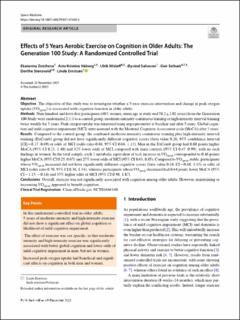| dc.description.abstract | Objective The objective of this study was to investigate whether a 5-year exercise intervention and change in peak oxygen uptake (VO2peak) is associated with cognitive function in older adults. Methods Nine hundred and forty-five participants (48% women, mean age at study end 78.2 ± 2.02 years) from the Generation 100 Study were randomized 2:1:1 to a control group, moderate-intensity continuous training or high-intensity interval training twice weekly for 5 years. Peak oxygen uptake was measured using ergospirometry at baseline and after 5 years. Global cognition and mild cognitive impairment (MCI) were assessed with the Montreal Cognitive Assessment scale (MoCA) after 5 years. Results Compared to the control group, the combined moderate-intensity continuous training plus high-intensity interval training (ExComb) group did not have significantly different cognitive scores (beta value 0.26, 95% confidence interval [CI] − 0.17, 0.69) or odds of MCI (odds ratio 0.86, 95% CI 0.66, 1.13). Men in the ExComb group had 0.80 points higher MoCA (95% CI 0.21, 1.40) and 32% lower odds of MCI compared with male controls (95% CI 0.47, 0.99), with no such findings in women. In the total sample, each 1 metabolic equivalent of task increase in VO2peak corresponded to 0.46 points higher MoCA (95% CI 0.25, 0.67) and 27% lower odds of MCI (95% CI 0.63, 0.85). Compared to VO2peak stable, participants whose VO2peak increased did not have significantly different cognitive scores (beta value 0.24, CI − 0.68, 1.15) or odds of MCI (odds ratio 0.70, 95% CI 0.36, 1.34), whereas participants whose VO2peak decreased had 0.64 points lower MoCA (95% CI − 1.15, − 0.14) and 35% higher odds of MCI (95% CI 0.98, 1.87). Conclusions Overall, exercise was not significantly associated with cognition among older adults. However, maintaining or increasing VO2peak appeared to benefit cognition. | en_US |

